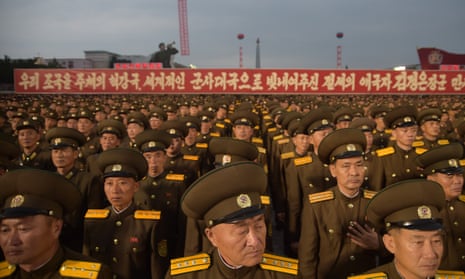In Washington, all roads to Pyongyang go through Beijing, the only capital presumed to possess the wherewithal to reach North Korea’s reclusive young dictator, Kim Jong-un, and pull him back from the nuclear brink.
Certainly, Donald Trump thinks so, persistently tweeting his complaints about Beijing’s failure to rein in its fraternal communist neighbour, and even threatening to cut off trade with China if it keeps doing business across the border.
Style points aside, Trump is not the first US president to assume that China holds the key to halting North Korea’s now decades-old programme to build a nuclear bomb and put it on a ballistic missile capable of hitting targets in America. Barack Obama berated Hu Jintao, then China’s president, in private at a number of meetings to put pressure on Pyongyang. George W Bush took the risk of doing a deal with Kim Jong-il in 2008 to dismantle the nuclear programme, basing his decision in part on the belief that Beijing could see it through.
The CIA believes that Bush’s deal fell apart because Kim Jong-il became gravely ill and decided to spend all his political capital at home to ensure that he handed over power to his son, just as he took over from his own father in the 1990s.
In contrast to Obama’s private entreaties and Bush’s painstaking diplomacy, Trump’s complaints have been public, blunt and, thus far, worth all but nothing in forcing a change in Beijing’s, or Pyongyang’s, behaviour. Trump’s tweets have landed at the most sensitive time in China’s political calendar, weeks before the quinquennial ruling party congress, at which President Xi Jinping is expected to secure a second term in office and gain absolute ascendency over the politburo.
Xi’s signature aim in office is to restore China to its position as a global power no longer pushed around by foreigners and it is hardly surprising that he has sturdily refused to engage Trump on Washington’s turf.
Yet there are deeper reasons for Beijing fending off Trump. Kim Jong-un’s madman antics aren’t just aimed at the US or South Korea and Japan. Students of the long-running drama on the Korean peninsula have long known that Pyongyang is just as happy to keep Beijing off balance.
China and North Korea, in their official propaganda, used to be fond of saying the two countries were “as close as lips and teeth”, but such rhetoric always masked a much more tense history. Kim Il-sung, who established the Kim dynasty in the north after the Pacific war and the end of Japanese colonial rule over the peninsula, always played the Soviet Union and China off against each other.
In the early 1990s, North Korea’s xenophobic siege mentality, a feature of the regime since its birth, was accentuated by Beijing’s decision to establish diplomatic ties with Seoul. China’s willingness to push ahead with its own market reforms also grated on its determinedly Stalinist neighbour.
For decades, the Chinese message to North Korea has been simple – like us, you too can have an authoritarian government with a capitalist economy, and foreign investment, even from the dreaded American imperialists. As late as 2001, the Chinese closed down one district in Shanghai to give Kim Jong-il a guided tour of the General Motors joint-venture car factory.
The Kims never bought it. For years, they criticised Chinese economic reform through their state-controlled media outlets, presenting it as revisionist capitalism from which the North Korean people should be spared.
In theory, China retains huge leverage over North Korea. China is responsible for more than 80% of both North Korea’s imports and exports, so it could easily apply a chokehold to its neighbour.
The latest demand by western countries – for China to cut off the oil it sends to North Korea through the Friendship Pipeline under the Yalu river – is doubtless one lethal way to bring Pyongyang to its knees. But Beijing has always worried about what might come next. A paranoid Pyongyang could turn against its neighbour and deprive China of a vital buffer between itself and South Korea, which is still host to thousands of US troops. Worse, it could collapse and send fleeing refugees pouring across its border.
Like the US and Japan, China is opposed to North Korea gaining nuclear weapons, but this objective is one that Beijing weighs carefully against its other interests on the peninsula, to maintain the status quo and avoid instability.
In that respect, China is a victim of a classic North Korean tactic – creating leverage out of weakness. In the same way as his father did with the west, Kim Jong-un has cultivated uncertainty and an element of distrust in his ties with China. This ensures that supplies of oil and food continue to flow across the border, whatever else he may do.
“Xi Jinping cannot abide Kim Jong-un,” said Kevin Rudd, the Chinese-speaking former Australian prime minister, who maintains close ties with the leadership in Beijing. “You don’t have to travel far in Beijing to hear words of derision about Kim’s personality and leadership style. They universally refer to him as ‘Fatty Kim’, or, in more polite circles, ‘the Young Gentleman’ – but rarely as ‘the Leader’.”
Personalities aside, Beijing also understands that Pyongyang’s antics could work in its favour, by draining the US military of time and regional resources at a time when Washington is struggling to keep up with China’s rise in territorial assertiveness.
“If a North Korean nuclear capability puts pressure on the future of US alliances in Asia, then that’s a problem for the United States, it’s not a problem for China,” said Rudd, in a recent speech in Stockholm. “There is also I believe an even deeper view within the Chinese military that a North Korean nuclear capability is a nine-out-of-10 problem for America, and a one-out-of-10 problem for China.”
Richard McGregor is a Washington-based author and journalist. His book Asia’s Reckoning: The Struggle for Global Dominance is published by Allen Lane
